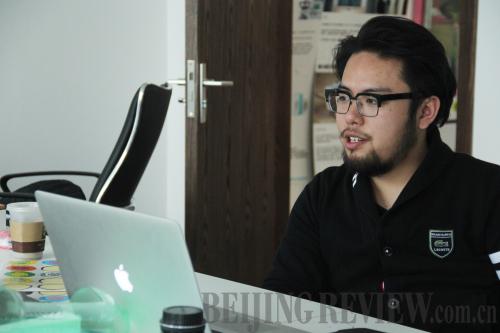|
 |
|
A PLACE WHERE DREAMS COME TRUE: Wang Shenglin, Founder of Beijing Makerspace, in his office (MA PING) |
Zhang Ming, a maker in his late 20s, read about 3D printers in a magazine, and then he decided to build one by himself. He bought necessary raw materials online and secured circuit boards from one of his friends. Now a printer he made is housed in Beijing Makerspace. It is used to print physical prototypes that would have been impossible to make as quickly or cheaply before.
Creative founders
Beijing Makerspace was jointly founded by Wang Shenglin and Xiao Wenpeng. Xiao, then a software programmer in a well-known computer company in Beijing, was passionate about open-source hardware. In his spare time, he often discussed design ideas with fellow enthusiasts through his blog. Later, they moved the online discussions to offline DIY gatherings.
In the beginning, they brought tool kits with them to every meeting. Not long after, they found a fixed venue was necessary.
"A big project cannot be finished at one meeting, and it is inconvenient to move half-finished products around town, so there must be a fixed place," Xiao said.
In the beginning of 2011, they rented a 20-square-meter apartment in central Beijing and met once a week with people who shared their interests in technology, design and art.
Among these DIY fans was Wang Shenglin. A holder of a finance degree from prestigious Renmin University of China, Wang Shenglin loves exploring science in his spare time.
He thought of making a touch screen desk after seeing a movie with scenes featuring intelligent furniture. He decided to turn the futuristic movie scene into reality. Months later, he made a desk with a surface like a giant iPad.
He and Xiao founded Beijing Makerspace together in 2011. A big difficulty was obtaining funding for the company. "From March 2011 to the beginning of 2013, there were no salaries for anyone," Wang Shenglin said.
In April 2012, Beijing Makerspace held a Makers Carnival in the country's capital, which was attended by dozens of makers from more than 10 countries. The event brought Beijing Makerspace to the attention of the Administrative Committee of Zhongguancun Science Park in north Beijing's Zhongguancun area, China's Silicon Valley. In 2012, the committee awarded the title of "Innovation Incubator" to Beijing Makerspace and supported it with an office of about 200 square meters. Later, the office space was expanded to nearly 1,000 square meters.
With more spacious office, the organization regularly hosts lectures and seminars as well as other activities such as Hackathon, ZHIZAO workshops and Creatica.
ZHIZAO workshops include training on operation of a rich variety of equipment and introductory courses on software application such as AutoCAD and Pro/Engineer.
Creatica is a creative education program to inspire children to "think, argue and be creative." It is offered in the forms of summer and winter camps and weekend activities.
Now, these activities are sponsored by companies such as Intel, Lenovo, and Google.
Wang Shenglin said that his team also provides a one-package solution to makers who want to start their own businesses. To develop a product, a startup team has to do many trivial, but time consuming things—such as finding hardware and software engineers—and after producing product prototypes, finding people to design the packaging, market products, and providing after-sale services. Wang Shenglin said that his company helps them solve these problems.
In addition, the team also produces devices in small batches for makers all over the world.
In his eyes, the past decade was one of the Internet, while the coming decade is one of "software+hardware+cloud technology," so it is a decade of end products and of makers.
Makerspaces have already spouted up in cities such as Shanghai, Shenzhen, Chengdu and Guiyang.
On January 4, the first work day in 2015, Chinese Premier Li Keqiang visited the Chaihuo Maker Space in Shenzhen, south China's Guangdong Province. Li's visit signals the government's encouragement to both maker spaces and makers.
Email us at: wanghairong@bjreview.com | 